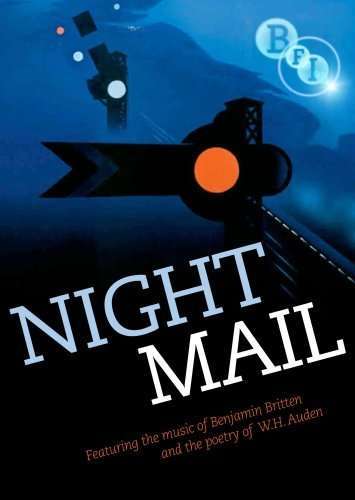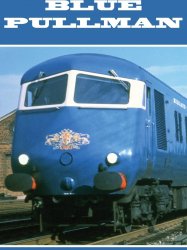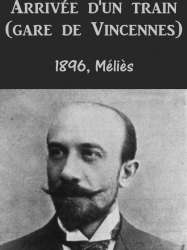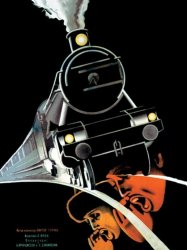The Way to the Sea is a British film of genre Documentary with Norman Wooland
The Way to the Sea (1936)

If you like this film, let us know!
The Way to the Sea is a 1936 documentary film about the London to Portsmouth railway line (what is now known as the Portsmouth Direct Line) and its recent electrification. This is prefaced with an historical representation of Portsmouth and the London to Portsmouth road (known in the Roman era as Ermin Street and Stane Street). It was produced by the Strand Film Company.
Its music was written by Benjamin Britten and its commentary by W. H. Auden, who also wrote the music and words respectively for the similarly themed Night Mail that year. The music from both films was broadcast at 3pm on Saturday 1 September 2007 at the Cadogan Hall as a Proms Matinee concert, narrated by Samuel West. [1]
Actors

Norman Wooland
(Commentator (voice))
Comments
Leave comment :
Suggestions of similar film to The Way to the Sea
There are 17 films with the same actors, 8969 with the same cinematographic genres, 7108 films with the same themes (including 32 films with the same 3 themes than The Way to the Sea), to have finally 70 suggestions of similar films.If you liked The Way to the Sea, you will probably like those similar films :

Railroad of Hope (2002)
, 56minutesDirected by Ning Ying (宁瀛)
Genres Documentary
Themes Transport films, Rail transport films, Documentary films about technology
Rating72%






Terminus (1961)
Directed by John Schlesinger
Genres Drama, Science fiction, Documentary, Action, Adventure, Horror
Themes Transport films, Rail transport films, Documentary films about technology
Actors Peggy Ashcroft, Margaret Lacey, John Schlesinger
Rating70%






John Betjeman Goes By Train (1962)
, 10minutesOrigin United-kingdom
Genres Documentary
Themes Films about writers, Transport films, Rail transport films, Documentaire sur une personnalité, Documentary films about technology
Rating72%






Blue Pullman (1960)
Origin United-kingdom
Genres Documentary
Themes Transport films, Rail transport films, Documentary films about technology
Rating77%






Directed by Georges Méliès
Origin France
Genres Documentary
Themes Transport films, Rail transport films, Documentary films about technology
Rating49%






The Steel Road (1929)
Directed by Victor Tourine
Genres Documentary
Themes Transport films, Rail transport films, Documentary films about technology
Rating71%





Le film raconte la construction du chemin de fer Turkestan-Sibérie (Türksib) et son rôle dans le développement de la région de Jetyssou. Le réalisateur du film montre l'enthousiasme des constructeurs de la voie et l'étonnement des habitants du désert voyant les voies ferrées posées sur le sable.

Origin USA
Genres Documentary
Themes Transport films, Rail transport films, Documentary films about technology
Rating48%






Arrival of Tongkin Train (1901)
Origin USA
Genres Documentary
Themes Transport films, Rail transport films, Documentary films about technology

Taken for a Ride (1996)
, 55minutesOrigin USA
Genres Documentary
Themes Environmental films, Transport films, Films about automobiles, Rail transport films, Documentary films about business, Documentary films about environmental issues, Documentary films about technology, Road movies
Rating78%





Taken for a Ride begins with interviews on the inefficiencies and congestion on Los Angeles' highways. Next, the film displays a variety of archival footage on streetcar systems around the United States, demonstrating that streetcars were a widespread and efficient means of transportation. The film continues into a description of the General Motors streetcar conspiracy, starting with a history of National City Lines and Pacific City Lines and General Motors' investment in both companies. The film builds the argument that streetcar systems purchased by these companies were deliberately sabotaged through service reductions and fare increases, then replaced with profitable, less convenient, bus systems. Next, the film makes a connection between this conspiracy and the construction of the Interstate Highway System and the suburbanization of America in the face of the Highway revolts in the 1960s and 1970s. The film ends with footage of the reduction of Philadelphia's trolleybus system at the time of filming.

Snowdrift at Bleath Gill (1955)
, 10minutesOrigin United-kingdom
Genres Documentary
Themes Transport films, Rail transport films, Documentary films about technology
Actors Deryck Guyler
Rating70%





 Connection
Connection